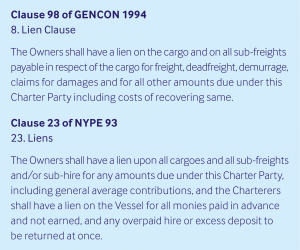В условиях высокой волатильности современного фрахтового рынка большое значение имеют требования, связанные с неуплатой фрахта.
Настоящая публикация посвящена такому способу борьбы за интересы судовладельцев (фрахтовщиков) как удержание груза. Отмечается важность договорного урегулирование отношений по поводу удержания, как в чартере, так и в коносаменте. Особое внимание уделяется согласованию положений английского права, которым часто подчиняются договора перевозки, с нормами права той юрисдикции, где будет проходить удержание груза. Рассматривается процесс удержания, а также право на реализацию удерживаемого груза судовладельцем, реализация которого во многих юрисдикциях чрезвычайно проблематична и зависит не только от императивных правил, закрепленных местной правовой системой, но и от формулировки соответствующей оговорки в контракте (договоре перевозки). В заключение подчеркивается роль и значение информационных отношений, то есть обязанности судовладельцев извещать лиц, заинтересованных в грузе, о своем намерении удерживать груз из-за неоплаченных сумм фрахта, в том числе арендной платы.
During periods in which the global shipping economy is volatile, the likelihood of unpaid freight or hire occurs with higher frequency. Recently, the Club has witnessed charterers facing difficulty in meeting their obligation to pay freight due under a charterparty. In such circumstances, the shipowner may want to know if he is able to exercise a lien on the cargo until he has been paid the freight or hire due under the charterer.
There must be a right of lien in the charterparty
The shipowner needs to determine if the charterparty will grant him a possessory lien over the cargo for the unpaid freight and hire. The more clearly a lien clause is drafted, the easier it is for the shipowner to determine the scope of the lien clause and therefore exercise his possessory lien for the unpaid freight or hire.
Examples of widely drafted lien clauses, that extend to protect the shipowners right to lien, are clause 8 of GENCON 1994 charterparty and clause 23 of NYPE 93.
Only when hire or freight under a charterparty becomes ‘due’ and ‘payable’ can the shipowner secure his rights against the party in default, by exercising a lien over the carried cargo.

The lien clause must be incorporated into the bill of lading
The relationship between the bill of lading holder and the shipowner is created by virtue of the contract of carriage contained in, or evidenced by, the terms and conditions in the bill of lading. The more precise the reference is to the charterparty in the bill of lading, the more protected the shipowner’s right is to exercise a lien over the cargo. A typical example of an incorporation clause is found in Clause 1 of Congenbill 2007:
“All terms and conditions, liberties and exceptions of the charterparty, dated as overleaf, including the Law and Arbitration Clause/Dispute Resolution Clause, are herewith incorporated”.
As such, where the bill of lading incorporates a lien clause for unpaid hire (as opposed to freight), the shipowners then has a right under the bill of lading to lien the cargo regardless of whether it is owned by the charterers.

The lien must be recognised by the courts in which the lien is sought to be exercised
Even if both the charterparty and the bill of lading are governed by English law, the shipowner must determine whether liens are recognised in the jurisdiction where the lien is to be exercised. In some jurisdictions, most commonly civil law jurisdictions, liens are not recognised and cannot be exercised unless the cargo is owned by the defaulting party. In addition to determining whether the right to lien is recognised by local law, the shipowner must also examine whether any formalities are required in order for a lien to be effectively exercised.
The shipowner must take sufficient steps to secure and exercise his right of lien (before parting possession of the goods).
In normal circumstances, the lien can be exercised when the vessel arrives at the discharging port, when it is anchored off the discharging port, or ashore – where the cargo can be safely discharged and stored in a warehouse without the shipowner losing possession.
The shipowner must ensure that possession of the goods is maintained after discharge
A lien over cargo is a possessory lien meaning that the lien will be redundant once possession is lost. For that reason, the shipowner must take appropriate measures to safeguard his right of lien over the cargo by, for example, warehousing the goods on his own account and expense. The retention of continuous possession, or at least of exclusive control of the cargo, is crucial for the exercise of a lien.
The shipowners’ right to sell the cargo to account for the unpaid freight
Unless expressly allowed by the charterparty, or provided under the local law, the shipowner is not entitled to sell the cargo. The existence of a power of sale will depend on the wording of the contract of carriage or the charterparty. In any case, the shipowner is under a duty of care towards the liened cargo and will be answerable for any loss or damage to the party entitled to the cargo.
Notification
The shipowner must notify parties who have an interest in the cargo (for example the charterer or the bill of lading holder) of his intention to exercise his lien. Failure to give such notice should only be considered as crucial in circumstances where notice is required under the contract or local law.
For cover to be made available to owners in potential dispute with a charterer and/or bill of lading holder, in the event of unpaid freight or hire, this would fall under the Club’s Legal Assistance and Defence cover (LADC).
Source: The Shipowners’ Club 2016
Источник: http://www.hellenicshippingnews.com/cargo-liens-for-unpaid-hire-and-freight-due-under-a-time-or-voyage-charterparty/

